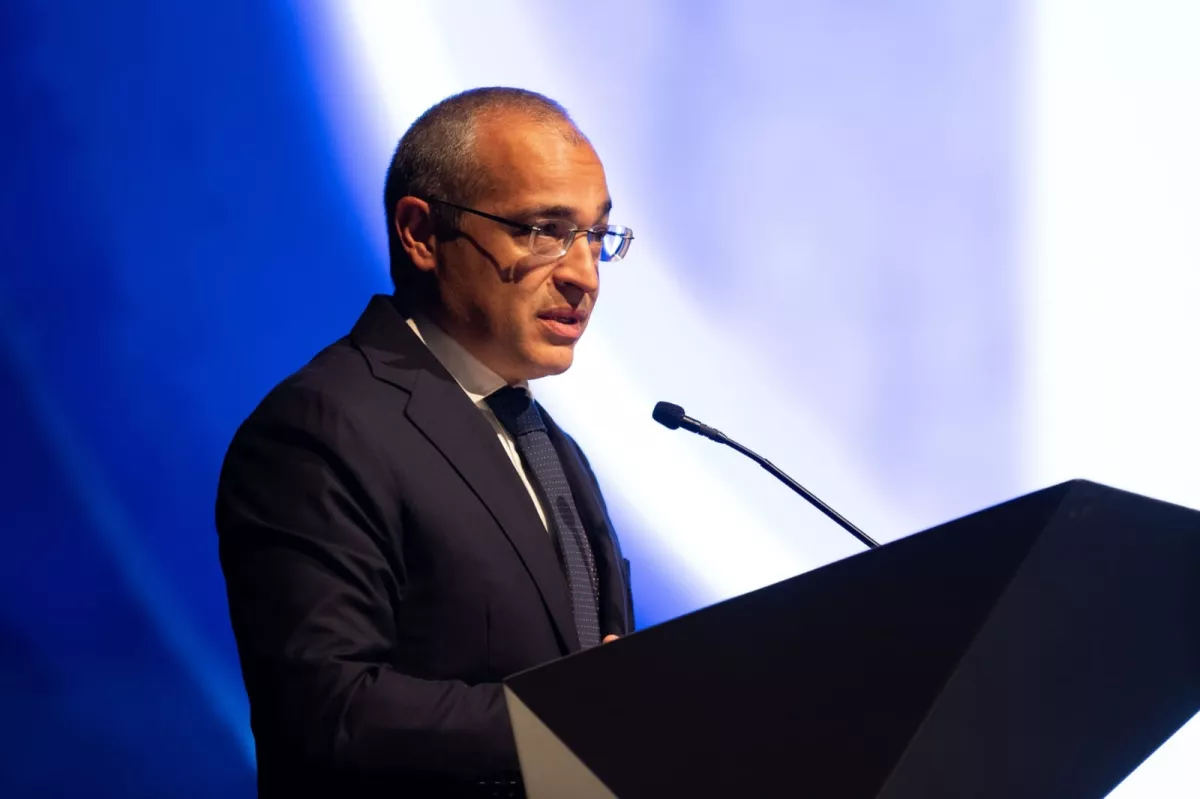INMerge Summit identifies key IT vectors in Azerbaijan Wave of digitalization
The development of human capital and the implementation of modern innovations have been identified as a strategic goal for the economic development of Azerbaijan in the foreseeable future. In particular, the tasks of the Fourth Industrial Revolution (4IR) involve the further development of network infrastructure, the digitalization of business processes and government management systems, the growth of the startup ecosystem, and the training of qualified IT personnel.
The participation of domestic IT companies in the division of labour in the global market is still limited, and today the country is facing a challenging search for an effective national business model. Azerbaijan's achievements in digitalization and upcoming tasks were discussed on October 10 in Baku during the annual international forum INMerge Innovation Summit organized by PASHA Holding.
The largest innovation forum in the region, the InMerge Innovation Summit, held for the fourth time, gathered leading high-tech companies, startups, and investors in Baku to discuss the prospects for forming an innovative ecosystem in Azerbaijan and the region as a whole. INMerge also serves as a strategic networking centre, enabling participants to explore opportunities for creating specialized collaborations, establishing partnerships, and developing regional and international cooperation with industry leaders and innovators.

As part of the two-day forum in Baku, workshops and discussions are scheduled on topics such as e-commerce, blockchain, artificial intelligence (AI), the development of software and startup ecosystems, and a presentation of several projects is expected. Notably, on the first day of the summit, the ceremony for the establishment of the venture fund INMerge took place. The founders include PASHA Innovations, the Innovation and Digital Development Agency (IDDA) under the Ministry of Digital Development and Transport, the Azerbaijan Investment Company (AIC), and the company Trendyol. The new venture fund INMerge aims to be one of the key tools for supporting local startups and will invest in similar structures in the South Caucasus region, Central and Eastern Asia, as well as the Middle East and North Africa.
"The state strategy for the development of the digital economy in Azerbaijan encompasses numerous initiatives aimed at creating an effective ecosystem for further growth and innovative development. The development of Azerbaijan's economy and innovative potential necessitates not only ensuring economic growth but also investing in human capital. Since 2017, a digital skills teaching system including startups, pilot projects, and programmes covering hundreds of thousands of students has been implemented in Azerbaijan," noted Azerbaijani Minister of Economy Mikayil Jabbarov, during his speech at the summit.
These educational reforms, including the "Sabah Hub" program, are aimed at developing the potential of promising students and creating a community of innovative specialists, and the Minister of Economy confirmed a satisfactory return on investments in this area. Thus, the "Digital Skills" project, implemented in Azerbaijan since 2017, has reached 650,000 students this year. Mr. Jabbarov also emphasized the importance of openness to foreign specialists and investors in relevant fields: "Azerbaijan is open to talented professionals coming from abroad, and they are supported through the 'Highly Skilled Migrant Program."
According to the minister, key innovative competencies are one of the main criteria that allow the country to adopt advanced international experience, knowledge, and technologies to accelerate the development of an innovative economy. It is worth noting that similar initiatives are being implemented through the Innovation and Digital Development Agency (IDDA): under this structure, qualified personnel for the IT sector are being trained, and the Technest scholarship program is being implemented, with the number of graduates already exceeding 4,000 and expected to reach 19,000 in the near future.

In turn, during the INMerge forum, the Minister of Digital Development and Transport, Rashad Nabiyev, reminded that in 2024, one in every three dollars of investment worldwide is directed toward startups related to artificial intelligence.
"Azerbaijan also aims to take leading positions in this field and has already developed an ambitious national project for a strategy to develop artificial intelligence. Plans are underway to introduce artificial intelligence (AI) education in 70% of universities in Azerbaijan. There is a 50% increase in the number of research articles on artificial intelligence. We aim to create a fully AI-based innovation centre at one of the major universities. Additionally, we are preparing scenarios for the use of artificial intelligence in both government institutions and the private sector," noted Rashad Nabiyev.
The capabilities of AI were also demonstrated through a pilot project, which provided 10,000 citizens of Azerbaijan with free access to online learning on the Coursera platform, reported Fariz Jafarov, the Executive Director of the Center for Analysis and Coordination of the Fourth Industrial Revolution (4IR), during the summit. He noted that the next phase of the program aims to reach 200,000 people, also on a free basis: "For the first time in Coursera's history, we are translating 2,500 courses into Azerbaijani using AI technologies."
According to the Minister of Digital Development and Transport, efforts are also ongoing in Azerbaijan to digitally transform the government and develop e-government tools. "We have fully digitized four main areas that play a role in the interactions between government agencies and the population, and today 35% of interactions occur in digital format, which helps reduce physical contacts, save time, and minimize environmental impact," added Rashad Nabiyev.
The minister noted that in Azerbaijan, over 47 million operations were conducted in 2024 using the digital platforms SİMA and ASAN imza, and this year, none of the operations were subjected to cyberattacks: this enhances trust in digital platforms, which are actively used not only in the everyday activities of the government but also in other areas. One example is the "Digital Bridge" project—one of the key components of digital government, facilitating more efficient information exchange between government institutions. Today, over 70 government agencies in Azerbaijan and more than 100 information systems are integrated into the "Digital Bridge," and the development of digital document management is an important step toward paperless governance in the country.

At the same time, the Online Azerbaijan project, which was initiated two years ago, is nearing completion. The goal of this project is to lay fibre optic lines to the most remote areas of the country. "When we started the project, the average internet speed in Azerbaijan was around 12 Mbps, and by the end of this year, the average speed may exceed 80 Mbps," emphasized the minister.
In our country, efforts are planned to strengthen the coordination of the multifaceted activities undertaken by government agencies to implement modern innovations and digitalize the economy. To this end, Azerbaijan plans to launch a comprehensive Digital Economy Development Strategy in 2025, which will include over fifty key initiatives in crucial areas such as human capital development and the promotion of IT technologies. Speaking at the Baku summit, Rauf Najafli, an advisor to the Minister of Economy of Azerbaijan, noted that the Digital Economy Strategy will aim to create a sustainable and competitive digital economy, with the country’s favourable geographical location and human potential providing the necessary conditions for the implementation of state programs in this field.
It is worth mentioning that under the aegis of the Center for Analysis and Coordination of the Fourth Industrial Revolution (4IR) operating under the Ministry of Economy, a special working group has been established since December 2022 to develop a Digital Economy Strategy through 2030. The document outlines 51 major initiatives that cover the modernization of network infrastructure and digitalization within the framework of the Industry 4.0 concept in sectors such as tourism, transport and logistics, industry, agriculture, and food security. The strategy also includes areas such as Big Data, AI, the Internet of Things (IoT), and digital marketing. It is planned to actively implement mechanisms for public-private partnerships within the strategy, including the involvement of the private sector in the implementation of about 34 projects, while approximately a dozen initiatives are planned in the public sector.








